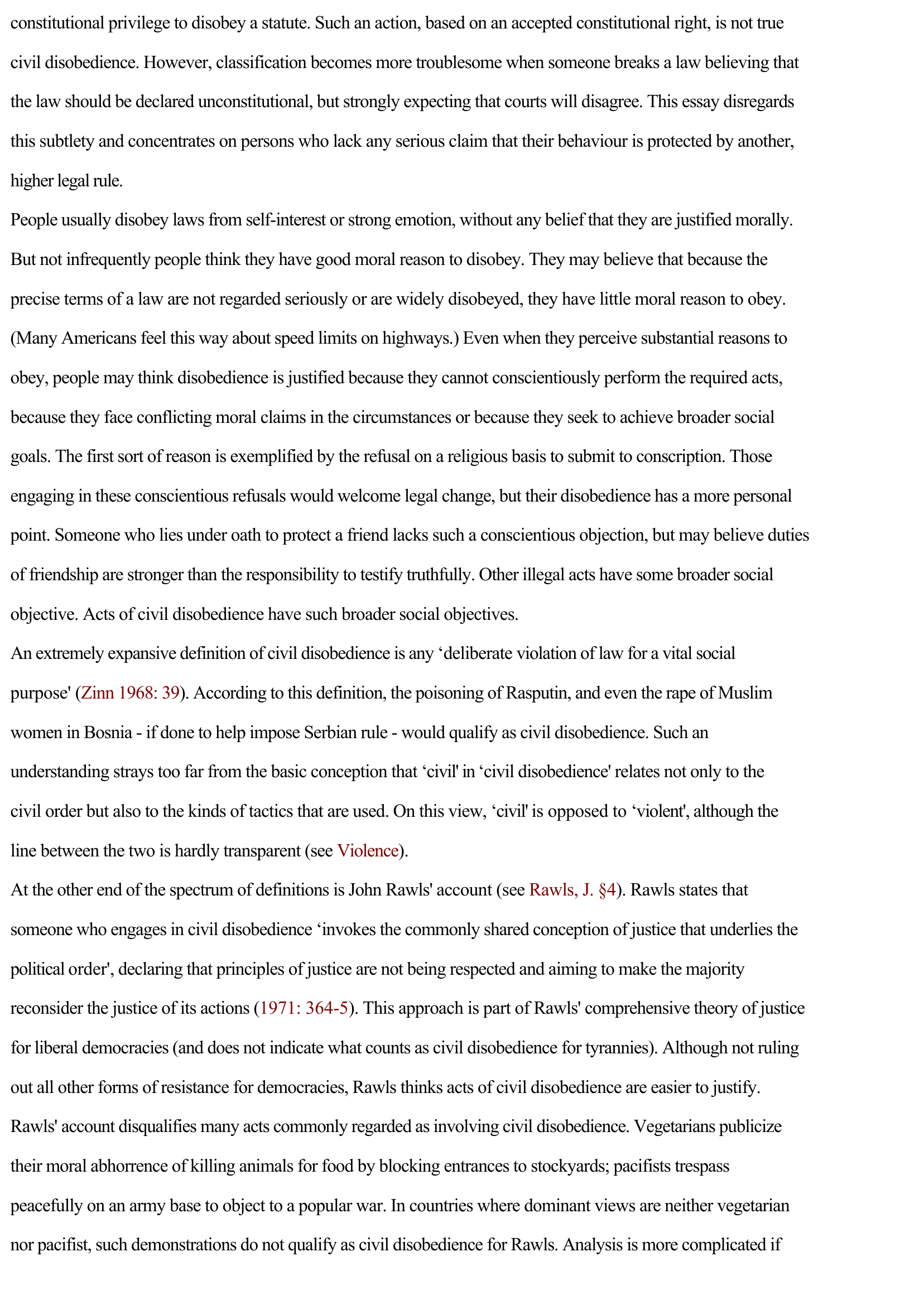Civil disobedience
Publié le 22/02/2012

Extrait du document
«
constitutional privilege to disobey a statute.
Such an action, based on an accepted constitutional right, is not true
civil disobedience.
However, classification becomes more troublesome when someone breaks a law believing that
the law should be declared unconstitutional, but strongly expecting that courts will disagree.
This essay disregards
this subtlety and concentrates on persons who lack any serious claim that their behaviour is protected by another,
higher legal rule.
People usually disobey laws from self-interest or strong emotion, without any belief that they are justified morally.
But not infrequently people think they have good moral reason to disobey.
They may believe that because the
precise terms of a law are not regarded seriously or are widely disobeyed, they have little moral reason to obey.
(Many Americans feel this way about speed limits on highways.) Even when they perceive substantial reasons to
obey, people may think disobedience is justified because they cannot conscientiously perform the required acts,
because they face conflicting moral claims in the circumstances or because they seek to achieve broader social
goals.
The first sort of reason is exemplified by the refusal on a religious basis to submit to conscription.
Those
engaging in these conscientious refusals would welcome legal change, but their disobedience has a more personal
point.
Someone who lies under oath to protect a friend lacks such a conscientious objection, but may believe duties
of friendship are stronger than the responsibility to testify truthfully.
Other illegal acts have some broader social
objective.
Acts of civil disobedience have such broader social objectives.
An extremely expansive definition of civil disobedience is any ‘deliberate violation of law for a vital social
purpose' (Zinn 1968: 39 ).
According to this definition, the poisoning of Rasputin, and even the rape of Muslim
women in Bosnia - if done to help impose Serbian rule - would qualify as civil disobedience.
Such an
understanding strays too far from the basic conception that ‘civil' in ‘civil disobedience' relates not only to the
civil order but also to the kinds of tactics that are used.
On this view, ‘civil' is opposed to ‘violent' , although the
line between the two is hardly transparent (see Violence ).
At the other end of the spectrum of definitions is John Rawls' account (see Rawls, J.
§4 ).
Rawls states that
someone who engages in civil disobedience ‘invokes the commonly shared conception of justice that underlies the
political order' , declaring that principles of justice are not being respected and aiming to make the majority
reconsider the justice of its actions ( 1971: 364-5 ).
This approach is part of Rawls' comprehensive theory of justice
for liberal democracies (and does not indicate what counts as civil disobedience for tyrannies).
Although not ruling
out all other forms of resistance for democracies, Rawls thinks acts of civil disobedience are easier to justify.
Rawls' account disqualifies many acts commonly regarded as involving civil disobedience.
Vegetarians publicize
their moral abhorrence of killing animals for food by blocking entrances to stockyards; pacifists trespass
peacefully on an army base to object to a popular war.
In countries where dominant views are neither vegetarian
nor pacifist, such demonstrations do not qualify as civil disobedience for Rawls.
Analysis is more complicated if.
»
↓↓↓ APERÇU DU DOCUMENT ↓↓↓
Liens utiles
- td droit civil séance 8 l'exercice de l'autorité parentale et ses limites
- Commentaire sur le discours du président Grévy devant le Sénat: arrêt de la Cour de cassation 1er chambre civil rendu le 14 février 1995
- John Locke et les lois - extrait du Second traité du gouvernement civil
- Introduction Droit Civil
- Responsabilité civil

































